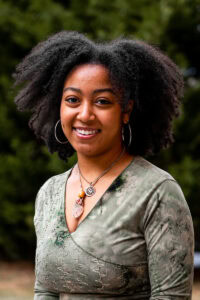Jordyn Shumpert ’25 attends philosophy workshop at the University of Michigan

Jordyn Shumpert ’26
Jordyn Shumpert ’25 participated in COMPASS at Michigan, a workshop designed to support underrepresented students who are considering graduate studies in philosophy, this fall.
The workshop, led by current graduate students, was held at the University of Michigan and included discussions, presentations, and mentorship sessions that explored philosophical topics in addition to the admissions process and graduate school experience.
“Having a group of students from different backgrounds express what they did, and didn’t do, in regards to all things school was so valuable,” said Shumpert, a theatre and comparative philosophy double major.
She was joined by fellow undergrads, recent graduates, and current master’s students interested in philosophy-specific programs, as well as law, literature, and more.
“We were a varied group and I think the variety lent itself to the intellectually rich conversations we had in regard to the philosophical work we engaged with,” she said. “I met people working with completely different philosophical questions than me and was fortunate enough to make connections with people who will make incredible contributions to the philosophical world. It’s made me more hopeful, which I am extremely thankful for.”
One panel featured faculty members who had previously sat on admissions committees for the University of Michigan’s graduate program in philosophy.
“They are all philosophers, so naturally our questions weren’t answered outright with ‘yes’ or ‘no,’ but instead with, ‘It depends because,’ which is a much more helpful answer than you might think,” Shumpert said. “It gave me more insight into what admissions committees are looking for.”
She found those insights surprisingly comforting: committees look for passionate thinkers, not perfectionists with rigid plans.
Shumpert also left with her own philosophical path more clearly defined and is now looking into PhD programs.
“I will, inevitably, have more school in my future,” she said. “I really would like to work with Black feminist and womanist texts. I say this, but I also think it would be completely antithetical to the type of texts I want to study to only be in service to academia. I hope to be able to engage with public philosophy projects in the future as well.”
Tags: Class of 2025, comparative philosophy, student scholarship
